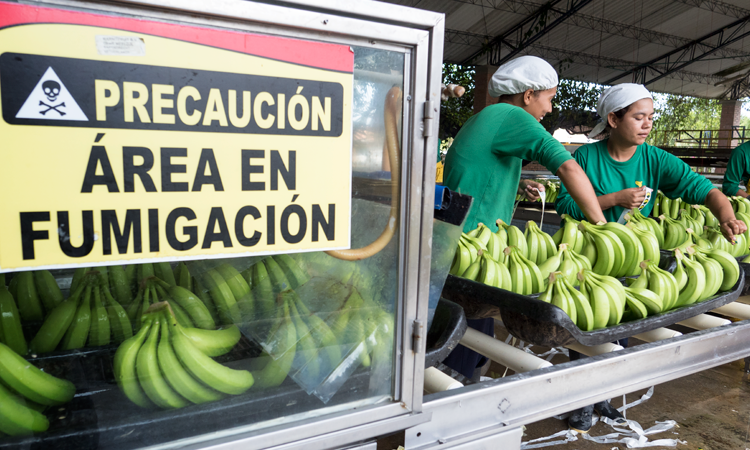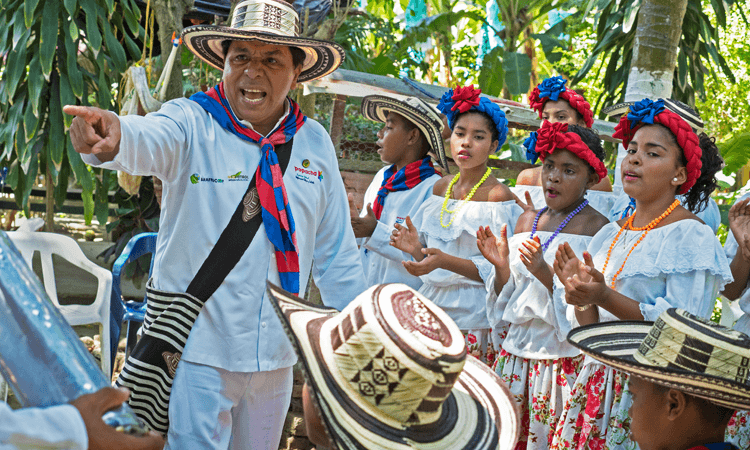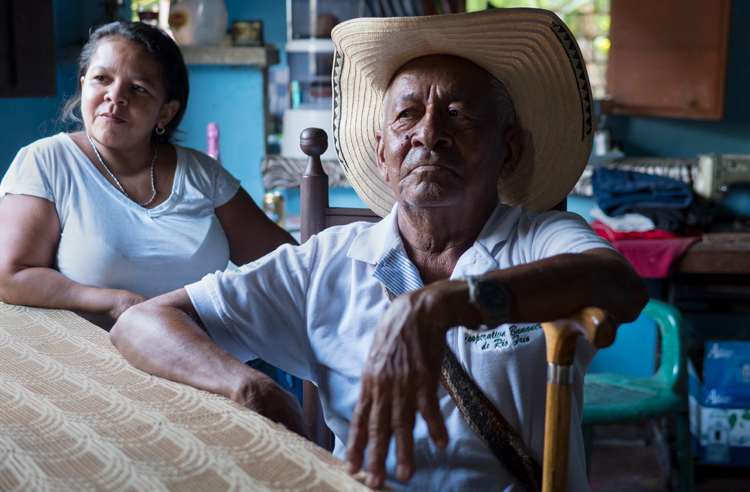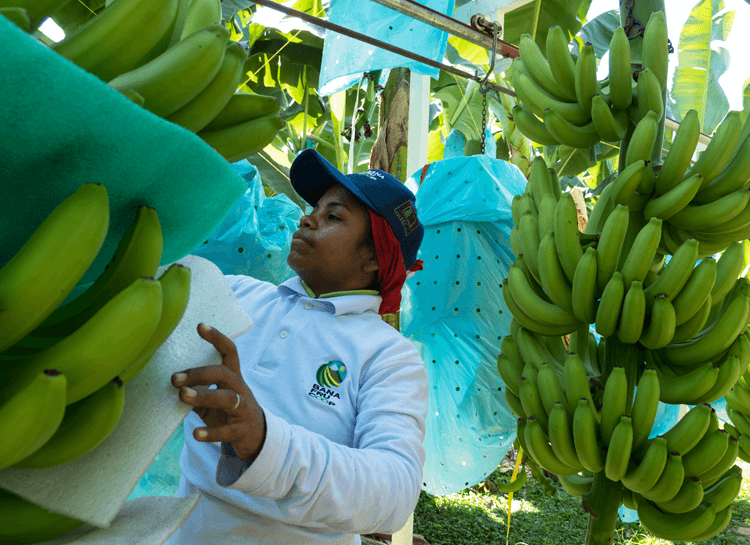by Martine Parry
High up on the superfood list, bananas are rich in Vitamin B6 and C and are a good source of dietary fibre and manganese. But the true heroes behind Britain’s favorite fruit are farmers like Foncho from northern Colombia who work incredibly hard to grow bananas for us on their small family farms.
High up on the superfood list, bananas are rich in Vitamin B6 and C and are a good source of dietary fibre and manganese. But the true heroes behind Britain’s favorite fruit are farmers like Foncho from northern Colombia who work incredibly hard to grow bananas for us on their small family farms.
Albeiro Alfonso ‘Foncho’ Cantillo is a member of Coobafrio, a Fairtrade co-operative located in the lush banana lands between Cienega and Santa Marta. Famously the face of Fairtrade’s award-winning ‘Stick with Foncho’ campaign a few years ago, he now has his own brand of bananas called ‘Foncho’s Bananas’. He, along with millions of other banana farmers and workers worldwide, has experienced many shocks over the years, and Fairtrade has helped him get through some of them, thanks to the continued support and loyalty of British banana lovers.
‘We experienced very difficult times when we weren’t in Fairtrade. We didn’t have the resources to provide an education for my children and the banana business barely provided enough for basic meals. It was very worrying to have children and know you couldn’t provide the opportunity for the life they deserve. Being in Fairtrade makes me very happy knowing that there are opportunities to achieve some of the goals I had planned.’ – Foncho
In spite of the pretty, multicoloured village houses and vibrant flora, the region is poor with high levels of unemployment, low levels of education and numerous social problems, including overcrowded housing, domestic violence and gangs.
Fairtrade works with small banana producer organisations to build the economic and social development of farmers and their communities. Fairtrade Standards require that farmers’ organisations are paid a Fairtrade price plus an additional Fairtrade Premium per box of bananas to invest in their business or farm development and community and environmental projects, which they choose collectively and manage via an elected committee. They also receive regular in-depth training in agronomy and best practice from the Fairtrade producer network in the region (CLAC).

In 2017, Foncho and the other members of his group had suffered yet another devastating hurricane* that had flattened the crops of many of his neighbours.
Maximillian, a neighbouring farmer, explains: ‘Thanks to the organisation and the committee, we have a fund for disasters. Those producers whose crops weren’t affected by hurricane Maria also gave money to those who lost their crop. Seventy percent of farmers’ crops were entirely wiped out, and some lost everything.’
Manuel Barrio adds: ‘I lost my whole crop with another hurricane two years ago. With the Fairtrade Premium, the farmers again pooled funds, but we wouldn’t have done that without Fairtrade, as 2% of the Premium is saved for natural disasters. But we also have insurance for our farmers. That’s the only way we can survive these things.’
Coobafrio have focused their collective income generated through sales of Fairtrade bananas on improving productivity and investing in fertiliser, drainage, irrigation and trenches. (Previously high costs of essential fertilisers prevented farmers from applying correct amounts, resulting in low yields.) This has improved crop sizes and led to better incomes. The farmers also used the Premium to set up an education fund to help members’ and employees’ children, as well as the wider community. It’s helped ensure 82% of members have been able to pay for their children’s education fees, uniforms, equipment and other costs. Foncho’s nephew is currently studying agricultural production in Santa Marta and the fund is helping cover his costs. Sports, dance and music groups have been set up to keep children off the streets and another separate pot of money has gone towards a home improvement fund, providing small loans to do up kitchens, flooring, and upgrade sanitation and roofing.

The Fairtrade Premium has also helped pay for members’ social security, meaning health and pension provision. In light of the latest pandemic, new guidance just issued by Fairtrade International means that producer organisations can spend Fairtrade Premium funds more flexibly to minimize the spread of disease, such as by purchasing and distributing face masks or other personal protective equipment, or by implementing hygiene campaigns.
Bananas producers in Colombia have been affected by decades of bloody civil war. They have seen guerrillas take over their farms and homes, demanding food and protection money.
Eighty-year old Jose Manuel Suarez has seen and experienced a lot over the years. Life has taught him to keep all his family’s land intact and never break it up, no matter what, even after he passes. He is the oldest producer member of Coobafrio so can draw from previous disasters.
‘In 1995, we had a hurricane which wiped out everything, so we had to take out expensive loans which we’re still paying off today.’
‘The violence during the civil war was very cruel. We suffered two major episodes of fighting, but it was worse for the bigger producers. Once I had a new pair of boots and a female guerrilla came onto the farm and asked me my size. She didn’t say anything, and just took my boots because they fit her. I couldn’t challenge: no one knows what would have happened to me if I had.’
Worse than the guerrillas were the paramilitaries who ran protection rackets and grabbed land. Many people were affected by the violence and forced to sell their land for an inflated price. But what do you do when you’ve spent your entire life on a farm and suddenly find yourself with lots of cash in your pocket? You move to the city. Many of these farmers are now banana farmers on plantations as opposed to land owners.
‘Forty years ago, we were so poor that we literally had to do everything on the farm with our bare hands. Today the farmers have the Fairtrade Premium which helps them and they don’t need to work as hard as they did then.’

Suarez said he was never temped to sell his farm to the big palm oil plantations. When the mayor offered him good money to sell up, he set his price at $1 million. He wants to keep it for his family so they can continue to farm bananas.
But the threat to the farm feels like a lifetime ago now and back then people were so scared they never thought they’d survive.
‘Now we have a television set, I can only imagine where my bananas end up. I love bananas, and I eat them every day. My secret to longevity is that I eat green bananas every day. And plantain, with my own green bananas on the side.’
Now banana farmers are facing a new line-up of challenges. The climate crisis is bringing strong winds, heavy rains, floods and droughts that can damage their crops. The first case of TR4, also called Panama disease, (a fungus disease which attacks bananas and has already destroyed 10,000 hectares of the Cavendish variety), was confirmed in Colombia in 2019, sparking fear among farmers and now COVID-19; the challenges seem endless.
So far, banana farmers like Foncho haven’t yet been heavily affected by Coronavirus as the virus has yet to establish itself in banana producing countries. However, public movement and distancing restrictions are now being introduced in some regions, with a 19-day lockdown in Colombia. The risk is that it could result in income losses among groups who were already vulnerable, and is likely to increase poverty.
The unprecedented global events of the last few weeks have driven home how connected we all are and how much we need one another for our food security, as millions of people in the UK’s food supply chains face the risk of illness and mortality from COVID-19. Protecting and supporting communities like these as the world faces the pandemic in isolated solidarity is Fairtrade’s number one priority. But with so much uncertainty, the support Fairtrade provides through the Fairtrade Minimum Price, Fairtrade Premium and the Fairtrade producer networks is more important than ever to farmers and workers.
Finding your usual Fairtrade products may be more difficult right now, and many of us have very pressing concerns for our families and local communities. But by buying and backing Fairtrade over the years, you’ve been making a real contribution to strengthening vulnerable communities across the world.
Find out where to buy Fairtrade bananas
* Hurricane Maria occurred in 2017
Photography by Ian Berry
